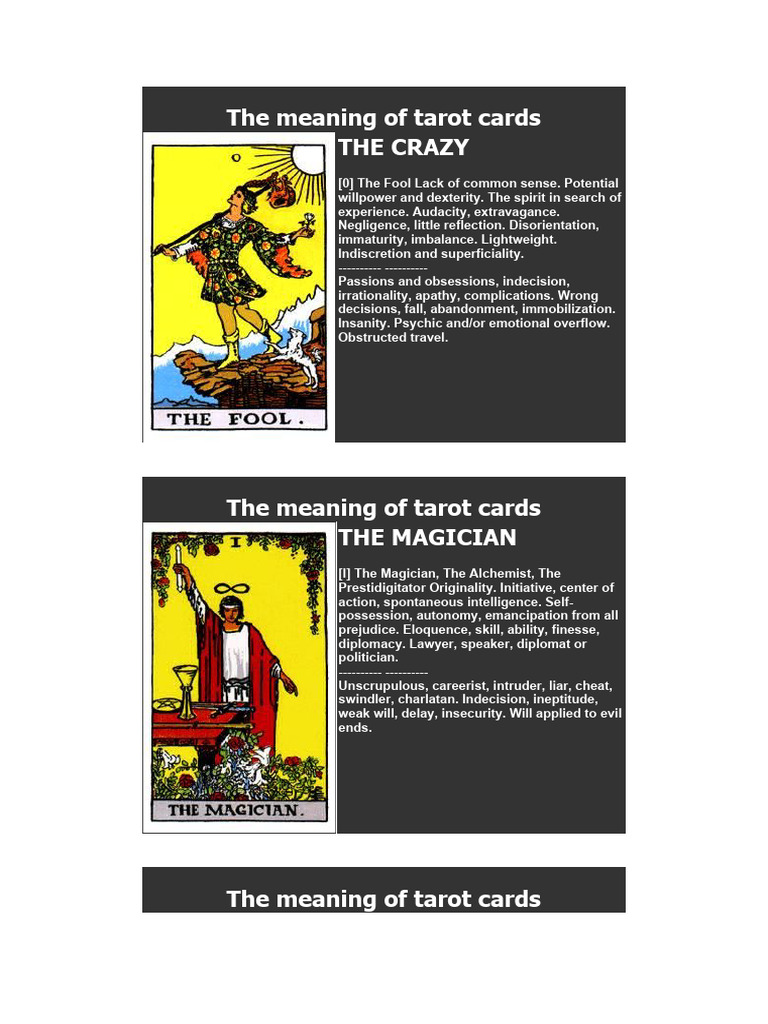The enigmatic world of tarot cards encapsulates a rich tapestry of symbolism and interpretation that has captivated enthusiasts for centuries. However, within the context of Christianity, tarot becomes a contentious subject, posing intriguing questions regarding its compatibility with Christian doctrine. Understanding the meanings of tarot cards from a Christian perspective requires a nuanced examination of their origins, cultural implications, and spiritual connotations.
From the outset, it is essential to grasp the historical background of tarot. Originating in the 15th century as a card game in Europe, tarot evolved to encompass a suite of mystical applications, particularly in divination. The transition from entertainment to a tool for spiritual insight raises substantive questions about the nature of wisdom and guidance as perceived through a Christian lens.
Historical Context
The use of tarot cards as instruments of divination emerged during the Renaissance, a period marked by significant intellectual and spiritual exploration. This era saw a confluence of various philosophical and theological traditions, including Neoplatonism and Kabbalistic thought, which influenced how tarot was perceived and utilized. It is crucial to note that Christianity, during this time, was largely skeptical of any practices that diverged from its theological tenets. Many Christian denominations view tarot as potentially leading adherents away from divine reliance and towards an unorthodox reliance on chance or the occult.
The Structure of Tarot Cards
A standard tarot deck consists of 78 cards, divided into the Major and Minor Arcana. Each card bears unique imagery and symbolism, thought to impart various meanings. The Major Arcana includes 22 cards that represent significant life events and spiritual lessons. Conversely, the Minor Arcana comprises 56 cards divided into four suits, each depicting everyday experiences. For Christians, these cards can be viewed metaphorically, as reflections of biblical themes and moral dilemmas. Certain cards may resonate with Christian teachings, potentially allowing for a constructive dialogue between tarot and scripture.
Symbolism and Interpretation
The imagery on tarot cards often invites extensive interpretation. For instance, the “Fool” card, representing beginnings and innocence, can parallel Christian notions of faith and childlike trust in God. Additionally, the “Death” card, often misconstrued as ominous, symbolizes transformation and rebirth—concepts befitting core Christian doctrines of resurrection and renewal. These connections suggest that, rather than outright condemnation, there may be room for discernment, encouraging a reflective engagement with tarot’s symbolism.
The Role of Intuition and Reflection
Many who practice tarot emphasize intuition and personal reflection, suggesting that the cards serve as catalysts for internal contemplation. This introspective quality may align with certain Christian practices such as meditation and prayer, where believers seek inner clarity and wisdom from God. Critically, discernment plays a pivotal role here; the emphasis must be on directing reflections towards divine guidance rather than self-serving insights.
Ethical Considerations
Ethical considerations surrounding tarot also warrant examination. Many Christian teachings emphasize the importance of seeking the Lord for guidance rather than turning to alternative sources. Engaging with tarot could pose risks, as it may inadvertently shift the focus from divine wisdom to human interpretation of fate. This concern stems from passages in scripture that warn against divination and sorcery; thus, for devout Christians, an explicit acknowledgment of these warnings is essential. It fosters a discerning approach, weighing the potential benefits of tarot against the adherence to faith.
Cultural Implications
The appeal of tarot extends far beyond its mystical origins; it resonates with contemporary cultural phenomena. Tarot has seen a resurgence among millennials and Gen Z, who often seek meaning and guidance amid uncertainty. Yet, within this cultural renaissance, a renewed dialogue with Christianity arises. This intersection allows for a fresh interpretation of tarot—one that respects spiritual convictions while embracing the quest for understanding and authenticity. For Christians, interfacing with this trend could open avenues for empathetic engagement with those exploring their spirituality through alternative lenses.
A Compromise or Conflict?
Ultimately, the relationship between Christianity and tarot may oscillate between conflict and compromise. Acknowledging the potential connections between tarot interpretations and biblical lessons can foster a more nuanced approach. It invites believers to reflect deeply and critically rather than dismiss outright. The key lies in intention and purpose. If tarot cards are approached as tools for personal growth and spiritual reflection, they may transcend their origins, offering insights that complement one’s faith journey.
Conclusion
In conclusion, exploring the meaning of tarot cards from a Christian perspective reveals a complex interplay between tradition and modern spirituality. While many Christian doctrines caution against the use of tarot as a divinatory tool, the symbolism encapsulated within each card can spark meaningful conversations around faith, reflection, and inner wisdom. Whether one views tarot with skepticism or curiosity, it prompts a vital exploration of what it means to seek guidance and understanding in a multifaceted world.







Leave a Comment